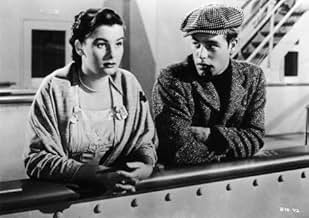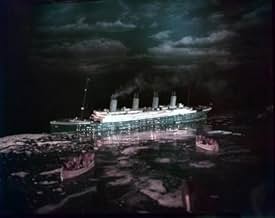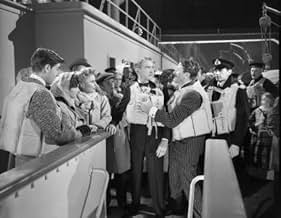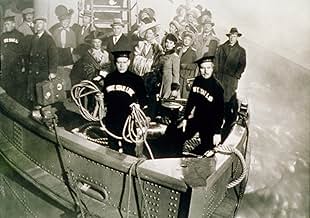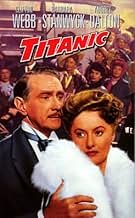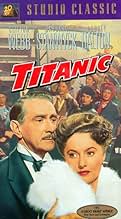An unhappily married couple struggle to deal with their problems while on board the luxurious, ill-fated RMS Titanic.An unhappily married couple struggle to deal with their problems while on board the luxurious, ill-fated RMS Titanic.An unhappily married couple struggle to deal with their problems while on board the luxurious, ill-fated RMS Titanic.
- Won 1 Oscar
- 1 win & 3 nominations total
- Seaman
- (uncredited)
- College Girl
- (uncredited)
- Jean Pablo Uzcadum
- (uncredited)
- Passenger
- (uncredited)
- First Officer Murdock
- (uncredited)
- Passenger
- (uncredited)
- Dock Official
- (uncredited)
Featured reviews
Built around the domestic drama of a fictional family, the well-known story of the sinking of the Titanic unfolds in an unrelenting and straightforward fashion. Brian Aherne (as the captain) is the victim of delayed and incorrect information and sails the ship right into the iceberg. We get glimpses of the rich and famous who populated the doomed ship as well as the luscious interiors of the ship.
The special effects are tremendous without taking over the film. The final scenes of the sinking ship are awesome. But the story of innocent passengers takes center stage here. Stanwyck and Webb are a squabbling couple with two children. The girl (Audrey Dalton) is a snob who is charmed by a college boy (Robert Wagner). Thelma Ritter plays a Molly Brown- like character addicted to loud jewelry and cards. Richard Basehart plays a defrocked priest. Allyn Joslyn plays the infamous coward who dresses like a woman to gain a seat on a lifeboat. Oh, and that's Mae Marsh the kid gives his seat to.
The final scenes of Webb and son are superb. An excellent film.
Nonetheless, Ray Kellogg's special effects are outstanding, especially the liner as it lists headfirst into the water that became a spectacular logo for the movie's ad campaign. Note, however, the general absence of noisy panic surrounding the evacuation, the opposite of what you would expect given the life and death circumstance. Generally, both passengers and crew react efficiently as if executing a fire drill. I suspect anything more realistic would have risked unsettling 1950's audiences and dampening box-office appeal, but whatever, the general absence is noticeable. Also, I'm not clear on what happened to the women and children in steerage. These are the poor folk presumably responding to America's "give us your huddled masses yearning to be free". Maybe I missed something, but the class segregation aboard the liner is made unmistakably clear and we do know the ladies and children of wealth made the cut. But what about those "huddled masses" since the movie is based on fact? Still and all, not to worry since they're all going to heaven anyway as the final choral overlay assures us.
Speaking of class struggle, too bad the screenplay doesn't exploit the lively potential of a Clifton Webb-Thelma Ritter face-off. They're two extreme ends of the refinement spectrum — the earthy commoner and the waspish aristocrat. Yet no one was better at delivering sarcastic barbs than these two. Squaring them off against one another would have produced great verbal fireworks and social contrast. All in all, the movie is entertaining with some good moments, but fails to hit the dramatic high points inherent in the real life tragedy. Ultimately, the screenplay reflects the extreme cautiousness of its time period.
In this version, Stanwyck is actually leaving her husband (Webb), unbeknownst to him, but when he realizes what's happening, he bribes the father in a lower class for his ticket. Webb is a social climbing, superficial man, and his American wife wants more for her kids than snobbery, arranged marriages, and a series of hotels instead of a home, so she is going back to her family with the children. What happens to Webb and Stanwyck's relationship during the voyage is powerful, touching - and, alas, too late.
While on board, a young, gorgeous Robert Wagner plays a college student suitor to the daughter, played by Audrey Dalton. Webb's last scene with Stanwyck will leave you in tears, and if it doesn't, there's also the poignant scene on deck with his son, Norman, which is beautiful.
I don't pretend to be an expert on the Titanic - however, I know a little more than a friend at work who, announcing she was seeing the Cameron version when it first came out, said, "Don't tell me how it ends." I realize that the Fox script drew a good deal of information from the navigation reports of the ship; however, I saw a documentary which showed footage of this film while it demonstrated that in this telling, the underwater scene shows the iceberg hitting on the wrong side.
I have also seen "A Night to Remember," which I also remember as being a very emotional experience. Perhaps it's the story that tugs at our hearts, or the site of that huge vessel sliding beneath the surface. Whatever it is, this is a truly engrossing and heartwrenching film.
To update these comments almost seven years after they were originally written, the DVD of this film is definitely one for any Titanic buff to have in their collection. It features TWO separate commentary tracks, one by critic Richard Schickel and stars Robert Wagner and Audrey Dalton, the other by Titanic historians. There is also the original theatrical trailer and newsreel footage of the film's premiere and Oscar wins. Most impressive of all, though, is a fascinating feature-length documentary, narrated by Victor Garber (ship-builder Thomas Andrews in the Cameron/DiCaprio film), about the sinking of the Titanic and how's it's been presented in films and on TV from the silent era to the present. All this on one DVD.
Did you know
- TriviaDuring the boarding of the lifeboats, Norman Sturges (Harper Carter) changes seats with a woman who arrives at the last moment when the boat was completely full. This was inspired by the action of a Mexican passenger in first class named Manuel Uruchurtu, who did the same thing to a woman from second class who was refused a seat on the lifeboat. After he gave up his seat to her, he asked her to travel to Mexico, if she survived, and tell his wife what happened. His body was never found.
- GoofsTrying to buy a ticket at the last minute, Richard Sturges (Clifton Webb) is told that the voyage has been sold out since March. In fact, it wasn't even close to sold out.
- Quotes
Richard Sturges: [after Richard and Julia have been quarreling over who will have custody of their son] My dear Julia, I've been around enough bridge tables to recognize someone who's holding a high trump - play it now if you will.
Julia Sturges: We'll discuss it later.
Richard Sturges: Now!
Julia Sturges: All right, Richard. One question first?
Richard Sturges: If it's about Norman, you know the answer. No court in the world, no power in the heavens can force me to give up my son.
Julia Sturges: He is not your son.
- ConnectionsEdited into The Unsinkable Molly Brown (1964)
- SoundtracksThe British Grenadiers
(uncredited)
Traditional Music
Arranged by Herbert W. Spencer
Played by the band on the Titanic
- How long is Titanic?Powered by Alexa
- What is 'Titanic' about?
- Is 'Titanic' based on a true story?
- Why is Julia leaving Richard?
Details
- Release date
- Country of origin
- Languages
- Also known as
- Y el mar los devoró
- Filming locations
- Production company
- See more company credits at IMDbPro
Box office
- Budget
- $1,805,000 (estimated)
- Runtime1 hour 38 minutes
- Color
- Aspect ratio
- 1.37 : 1
Contribute to this page



